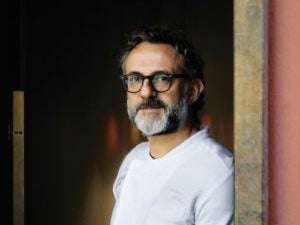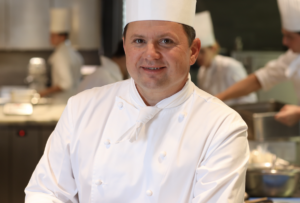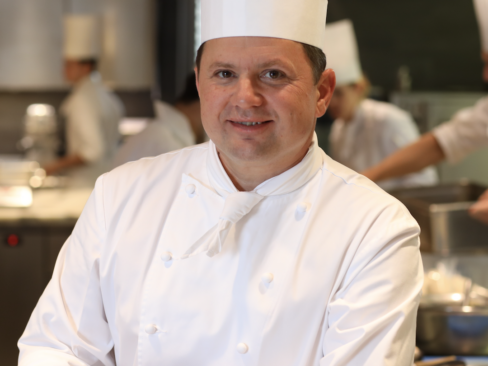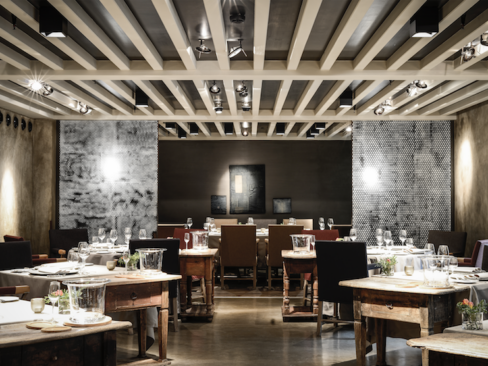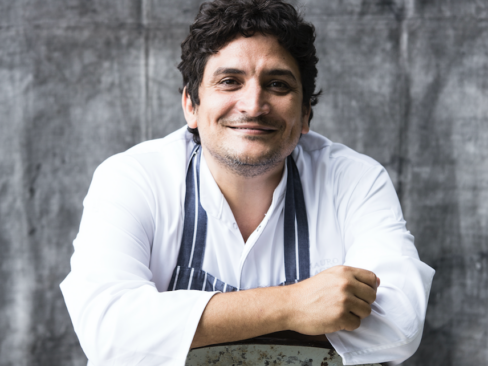By Lauren Jade Hill
 As the founder and chef of the three-Michelinstarred restaurant Osteria Francescana in Modena, Massimo Bottura rose to great acclaim for challenging the traditions of Italian cuisine, injecting creativity and playfulness into his menus. In an interview with Elite Traveler, the chef explains the root of his inspiration: “For me, influence is found in everyday life,” he enthuses. “If you live life with your ears and eyes open, any moment can teach you something new.” This is perhaps most evident in his signature dish, Oops! I dropped the lemon tart, which shows his sense of humor and inventive nature in equal measure. But whatever a guest chooses to dine on at Osteria Francescana, the experience is sure to be one to remember. “To me, it’s extremely important to talk to the people who come to the restaurant,” Bottura tells us, “Osteria Francescana is about emotion and the joy that comes to the table.”
As the founder and chef of the three-Michelinstarred restaurant Osteria Francescana in Modena, Massimo Bottura rose to great acclaim for challenging the traditions of Italian cuisine, injecting creativity and playfulness into his menus. In an interview with Elite Traveler, the chef explains the root of his inspiration: “For me, influence is found in everyday life,” he enthuses. “If you live life with your ears and eyes open, any moment can teach you something new.” This is perhaps most evident in his signature dish, Oops! I dropped the lemon tart, which shows his sense of humor and inventive nature in equal measure. But whatever a guest chooses to dine on at Osteria Francescana, the experience is sure to be one to remember. “To me, it’s extremely important to talk to the people who come to the restaurant,” Bottura tells us, “Osteria Francescana is about emotion and the joy that comes to the table.”
What does being voted Elite Traveler’s Chef of the Year mean to you?
It means the world to me. It means that my team and I have been able to communicate our mission and share our passions with our guests and the public at large. This recognition, though, is not about me, it’s about my team and what we have achieved together, not only at Osteria Francescana but also with the Food for Soul projects that we are developing. None of that could have happened without the research, development and support of the kitchen, front of house and back office team.We all are working together to make visible the invisible in our restaurant, our communities and around the world.
Why do you think people respond so well to your food?
The humanity, the emotions, the stories and Italian flavor. We work with the best of north and south, east and west. The Italian kitchen is all about diversity of ingredients, traditions and history. Our contemporary kitchen takes all of this and transforms it into a story, like a fairy tale or fable for the palate, to help our guests understand the roots of the Italian kitchen and why it has traveled the world.
Tell us about your all-time favorite dishes and what makes them stand out?
Traditional Modenese tortellini will always be on the top of my list. As a boy my refuge was the kitchen table where I would hide from my older brothers. There at nonna Ancella’s knees I felt the movement of rolling out the pasta dough. Flour would fall from the table and when she began to fold the tortellini, I would reach up and steal them and eat them raw. This is a flavor memory I can never forget.
After that, I love Japanese kaiseki and sushi, for the flavors but also for Japan’s almost stubborn obsession with quality. It really fascinates and inspires me. But there is nothing that satisfies you quite like Italian creamy gelato, and a Mexican taco made the right way — deep braised meat with balanced sauces, guacamole and green spicy salsa — is not something to be taken for granted.
 What experience can people expect to have when they dine at Osteria Francescana?
What experience can people expect to have when they dine at Osteria Francescana?
We do our best to bring our guests into our world with the narratives that accompany our dishes and impeccable service. Our restaurant is intimate and at each service there is only one seating, so I think we are able to create a very direct relationship with our guests. We hope to leave with them a lasting memory of the dishes, the stories behind them and the flavors, which can be familiar and new at the same time. Most importantly we hope that the journey — and many people travel hundreds of miles to sit at a table — is well worth the effort.
What do you still want to achieve in your career?
We are having a kind of Italian gastronomic renaissance right now. Italian food has never been better, not only in Italy but around the world. I hope our success at Osteria Francescana is a lighthouse for other Italian chefs to follow, because if we can do it, they can too. We have always been a small restaurant with big dreams, and that is the way we see our future. This means staying humble and not losing sight of the human side of the restaurant, which is the team. Without everyone’s contribution, we would not be where we are today.
Separately, there is still so much work to be done socially, and I believe, as a contemporary chef, I have a role to play in society. A recipe is as much an act of solidarity as it is a trace of the chef’s mind and identity. We are about to publish a book of recipes from our experience of cooking at Refettorio Ambrosiano in Milan with over 60 chefs from around the world. We turned an abandoned theater into an inspirational model for soup kitchens, providing food for kids and the homeless. The recipes reveal another side to the chefs, and their deep commitment to making better food for more people a reality. Founded by [wife] Lara and myself one year ago, Food for Soul is growing rapidly and we will be opening a Refettorio in London in June, where we’ll have more than 40 British chefs cooking with us. It is stimulating to put on another kind of chef’s hat to make visible the invisible, put ethics next to aesthetics and improve the quality of food for those who need it most





